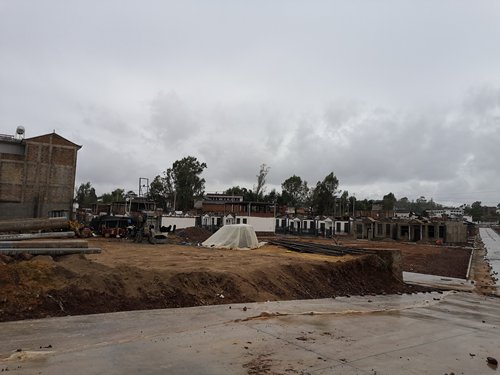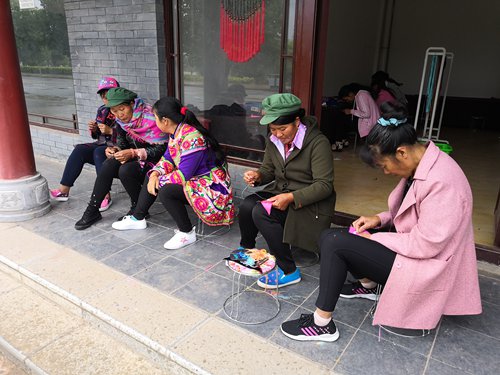
A construction site of new homes for families in poverty in Yongren county, Southwest China's Yunnan Province

Yi women learn to sew traditional clothes in an education program in Yunnan's Dayao county on Tuesday. (Photos: Wang Cong/GT)
From his small office in downtown Chuxiong city in Southwest China's Yunnan Province, Luo Xinggui has been commanding what he describes as a "100,000-strong army" on the frontlines of China's war against poverty.
As the deputy head of Chuxiong Yi Autonomous Prefecture's Office of Poverty Alleviation and Development, Luo said he has never felt this busy and under pressure before. There are endless meetings, mounting paperwork, constant phone calls and frequent overtime - all related to the prefecture's poverty relief efforts.
"We are fighting an all-out war with the participation of the entire society, and we have to win," Luo, a clean-cut man in his 40s, told the Global Times in an interview last Monday.
With a big proportion of its 2.73 million residents, most of whom are from the Yi, Lisu and other ethnic minority groups, living in extreme poverty, Chuxiong has become a main battlefield since the central government vowed to completely eradicate extreme poverty by 2020.
Under the ambitious goal, which targets more than 43 million people living in extreme poverty, or those with per capita annual income below 627 yuan ($97.69), the Chinese government has thrown in everything - from massive funding to policy support and manpower - to keep its promise.
As the deadline approaches fast and policy directives from higher levels of government pile up on their desks, Luo and his colleagues across the prefecture are working around the clock, organizing educational programs for rural workers, speeding up construction of new homes and getting more outside help.
Earth-shaking changes
"We are fighting this war with real projects and money, not just issuing policy documents or holding meetings," said Luo, who is keen to point out initial progress. "We have really taken targeted, very precise measures… and some villages are seeing marked changes."
Some of these changes are palpable in several counties under Chuxiong's jurisdiction, where brand new communities have been built or are under construction for poor residents in remote villages.
On a rainy Tuesday afternoon, just a few kilometers from downtown Yuanmou county, construction workers were trying to speed up construction of new homes for 934 poor families.
The project, which also includes schools, hospitals and business centers, covers more than 5.15 million square meters and has an estimated investment of 650 million yuan ($101.28 million), according to Zu Ling, deputy head of Yuanmou county government, who oversees the project.
"So far we are moving fast, thanks to the support of the families, who are eager to move in soon," he told the Global Times. Still, Zu said, the schedule is tight because the county has set a goal of moving in the families by the end of July, a seemingly impossible goal given the near-empty plot.
Li Shunguang, a member of the Lisu ethnic group in a small village in Jiangbian township, has been working at the construction site for several months, along with his wife and son, as a way to pay off their share of the cost for a new house.
The project is mostly paid for by government funds, but families are required to contribute a small proportion. Those who can't come up with the money can pay off their shares by working at the construction site.
Li's family of four received about 130,000 yuan from the government for the new home, and his family needs to pitch in 40,000 yuan for a one-story house.
"This is a great thing for us because Jiangbian has nothing. Each year we make a few hundred yuan through farming, just barely enough to fill our stomachs," Li said.
Many ethnic minority residents in Chuxiong are living in harsh conditions with no way to lift them out of poverty other than to relocate them to better conditions, officials say.
In 2017, Chuxiong allocated 118.5 million yuan for building new homes for 20,512 people, according to data provided by the Chuxiong poverty alleviation office. Officials plan to move 4,835 people in 2018.
Across the country, a total of 2.8 million people will be moved out of harsh conditions in 2018, according to the Government Work Report.
Longer plans
But simply moving families to a new home is not sustainable. The government has also organized programs to help families get new skills and find jobs, Chuxiong officials pointed out.
As part of the program, Yang Yingxiu, along with a dozen other women from the Yi ethnic group in Dayao county, attended her first lesson on Tuesday to learn to sew traditional Yi clothes. After training for three months, they can start work for a local company that produces traditional Yi clothes full time for a monthly salary of 1,500 yuan.
The women had just moved into new houses the government built for their families outside the county seat. In addition to the apartment, Yang said her family of three also received free home appliances and furniture as well as 600 yuan subsidies each month from the government.
In total, Chuxiong has organized skill training for more than 104,600 people and helped 43,300 people find jobs, according to official data. In addition to assigning officials to help, the government also offers monetary support to help residents find jobs in other cities.
Realistic struggles
While officials are quick to show the initial progress, they are also not hiding their concerns about challenges.
"The cause of poverty among these ethnic minority families is very complex and has a long history, so to make sudden changes is hard for them," Luo said. "We have to change their mindset, and that is a big challenge."
Some families refuse to move out of harsh conditions or struggle to assimilate to their new environment, and some are counting on government support and refuse to work to earn a stable income, according to officials.
"So what we do is to hold one-on-one talks with them and build relationships with them to convince them, but that takes time," Luo said.
Another big challenge is investment. While the central and the provincial governments provide a considerable amount of investment in poverty relief efforts, local governments also pick up a big portion of the check, Zu said.
"The most difficult problem is money," Zu said, "we have to investment a lot of money in industry development, otherwise they could fall back into poverty easily."


